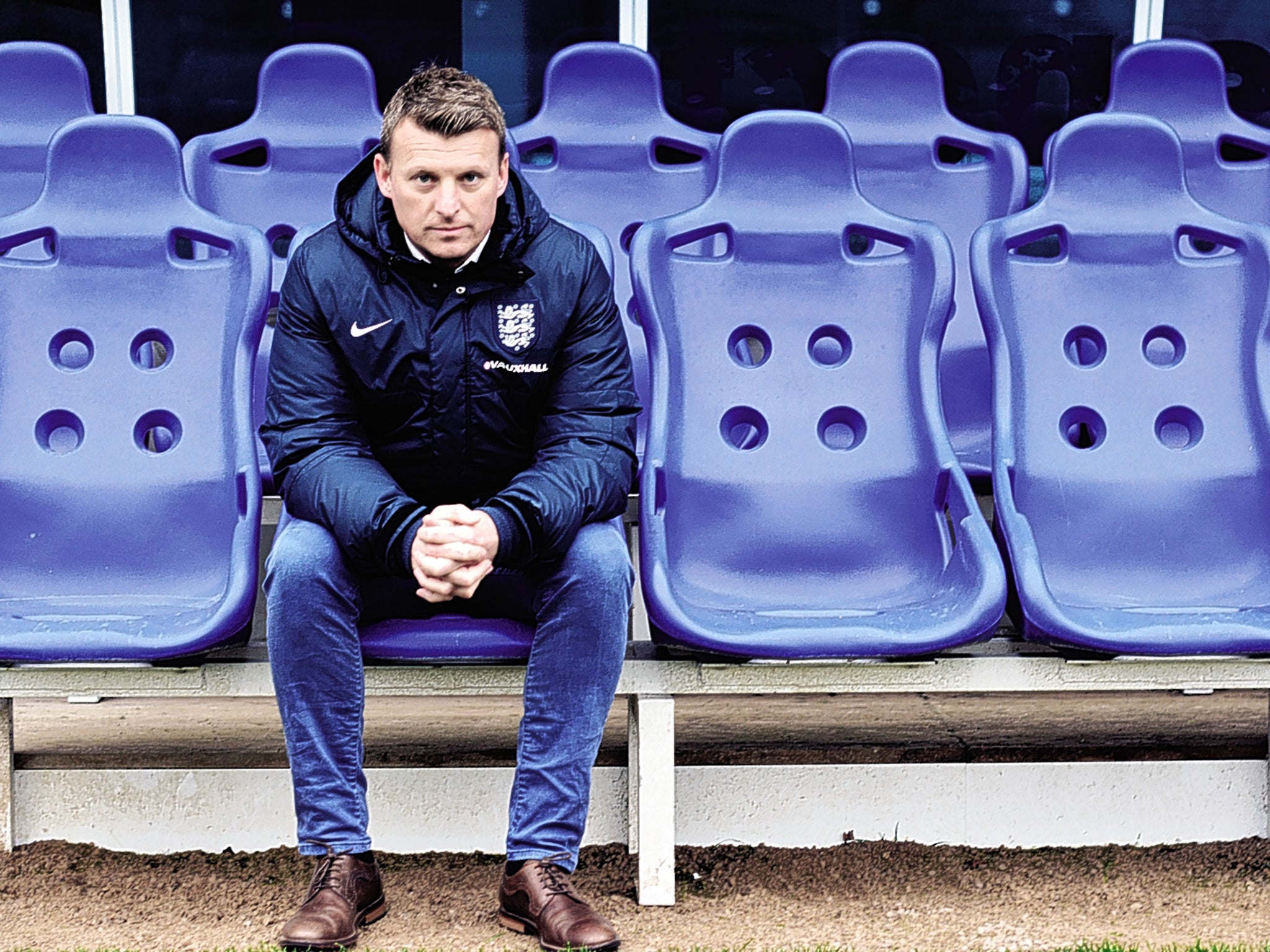England's plan for the 2022 World Cup: ‘Against Brazil you could not tell which was which’
Matt Crocker, the FA’s man in charge of development, tells Mark Ogden how recent successes for England junior sides demonstrate the ambitious DNA plan for 2022 World Cup glory is already delivering results

Your support helps us to tell the story
From reproductive rights to climate change to Big Tech, The Independent is on the ground when the story is developing. Whether it's investigating the financials of Elon Musk's pro-Trump PAC or producing our latest documentary, 'The A Word', which shines a light on the American women fighting for reproductive rights, we know how important it is to parse out the facts from the messaging.
At such a critical moment in US history, we need reporters on the ground. Your donation allows us to keep sending journalists to speak to both sides of the story.
The Independent is trusted by Americans across the entire political spectrum. And unlike many other quality news outlets, we choose not to lock Americans out of our reporting and analysis with paywalls. We believe quality journalism should be available to everyone, paid for by those who can afford it.
Your support makes all the difference.England’s attempt to win the 2022 World Cup will gather pace in Portugal, having been given a shot in the arm in Florida two months ago.
It will probably slip under the radar, and there will be no grinding of teeth within the Football Association about the relative lack of exposure, given a busy Premier League programme, but the England Under-17 squad which is due to face Portugal, Germany and the Netherlands in the Algarve Tournament this weekend may just become the rising stars who will travel to Qatar in six years’ time aiming to return from the Gulf as world champions.
Back in December, Dan Micciche’s Under-16 squad returned from the Nike International Tournament in Florida as winners of the competition, having drawn with the Dutch and beaten the United States and Brazil in Lakewood Ranch, while the Under-17s who won the European Championship in Malta in 2014 are now making accelerated progress as Under-19s under Aidy Boothroyd and are on course for this summer’s tournament in Germany.
The Football Association, which unveiled England DNA – the blueprint for producing successful national teams at all age groups – at St George’s Park in December 2014, is seeing the green shoots appear at underage level.


Matt Crocker, the FA’s head of player and coach development, insists that the bold claim by outgoing chairman Greg Dyke that England can win the 2022 World Cup is proving a motivation, rather than a burden, as the DNA begins to seep into the fabric of English football.
“The 2022 target is helpful because it puts a marker in the sand of where we want to get to,” Crocker said. “If we go, ‘We want to win the World Cup in 2022’, but to just sit here and don’t do anything, it isn’t going to happen, but at least we know the target.
“If we work backwards, from 2022 to now, what do we need to do to achieve that target?
“What will the game look like? Things like possible rule changes, the climate and conditions out there – the game will get quicker and players will become fitter and stronger, so how do we adjust to that?
“What we are doing now is trying to see what the game will look like in 2022 and ensure that the DNA reflects that, that we make the changes now that we need to make.
“But is it a burden? Not at all. It’s like saying nobody could do the four-minute mile – all that stuff goes out of the window.”
Alongside Dan Ashworth, the director of elite development, and Under-21 coach Gareth Southgate, Crocker helped devise the DNA to ensure all teams from Under-15s to Under-21s and Women’s Under-23s work to the same principles of coaching and development.
The 41-year-old, who oversaw the emergence of Luke Shaw, Alex Oxlade-Chamberlain and Calum Chambers during his time as academy manager at Southampton, believes that results and performances are showing that, just over a year since the DNA was rolled out, the plan is working.
“The 16s were recently in Florida and their performances were as close to being the DNA as we would wish for, not just because they won it, but they were playing Brazil and if the shirts had been the other way around, you wouldn’t know which was us and which was them,” Crocker said. “That’s nice, when you can visually see those things.
“What made the difference? The creativity of our players, their ability to dominate possession and create chances out of nothing.
“They could also defend with composure and manage the game appropriately, to understand what the game needs at the right time. What I saw is what we want from all the age groups in the future.”
But while progress is made away from the glare of top-level scrutiny with the juniors, how much rests on the performances of the seniors at Euro 2016?
“If you are going to change a philosophy or whatever you do, you are always going to look to affect the top end as quickly as you can,” Crocker said. “But football in this country, we don’t have the time to affect this bit and hope that, in six years’ time, they end up in the seniors.
“The whole pathway has to change and we have to have some really clear messages and strategies of what we want our players to do, from the Under-16s right through to the senior side.
“The biggest challenge has probably been to join it all up, but if Euro 2016 is a success, just imagine how much it will act as an inspiration.”
Yet while the FA is increasing the number of full-time coaches at St George’s Park and making qualification courses more accessible for those coaching youngsters at grassroots, the ultimate success of the DNA depends on players making the grade.
When Boothroyd’s Under-19s cruised to a 5-1 victory against Japan in Manchester in November, the team was largely drawn from Chelsea, Manchester City, Everton and Tottenham Hotspur, yet the only member of the starting XI who has enjoyed regular first-team football at club level this season is Lewis Cook of Leeds United.
Within the Premier League, emerging prospects are hitting a glass ceiling at 18 and 19 and disappearing into the reserves, only emerging two to three years later having missed out on crucial development time in the first team.
Having seen youngsters given their chance at Southampton, Crocker insists the pathway is there, but he accepts that it is an issue that must still be resolved satisfactorily.
“It’s a really difficult one and it is the big elephant in the room really,” Crocker said. “But myself, Dan Ashworth and the Premier League, we are all having those conversations to see how we change the cycle.
“But that issue hits the nail on the head and it’s not going to happen overnight. It’s a long-term process.
“What we doing in youth development, both here and at the Premier League, is that we share a vision that we want more young English players in the Premier League.
“All we can do is affect things. At Southampton, part of the progression was helped by being out of the Premier League, but I think it was also down to the people at the top.
“They had a philosophy that the kids would play and, whenever they appointed a manager, he came in on the premise that he would play the youngsters.
“Les Reed, the director of football, would always make sure that a manager was appointed on the basis of their readiness to adhere to the Southampton philosophy.
“It is why Mauricio Pochettino was successful there and why Nigel Adkins, before him, was successful, but obviously the boys had to be good enough too.”
But with the Premier League dominated by expensive imports, will we ever see another story to rival the emergence of the Class of ’92 at Manchester United?
“I’d like to think that, actually, the Class of ’92 concept might not happen again at one club, but the quality of players might be across a number of clubs,” Crocker said. “There is no reason why we cannot produce a crop of players of that quality and that ilk.
“Chelsea currently have a great model in terms of their development programme and talent ID model, while Tottenham have some fantastic, technical players who can do the things that we want them to do.
“There are others. Birmingham City are producing some great youth players, Fulham are on the way up, but overall in terms of consistency, Chelsea and Tottenham lead the way.”
Whether that path leads to glory in Qatar or another brick wall for England’s best young talent, only time will tell, but the clock is already counting down to Doha.
Join our commenting forum
Join thought-provoking conversations, follow other Independent readers and see their replies
Comments